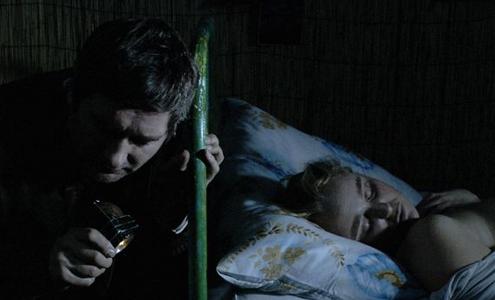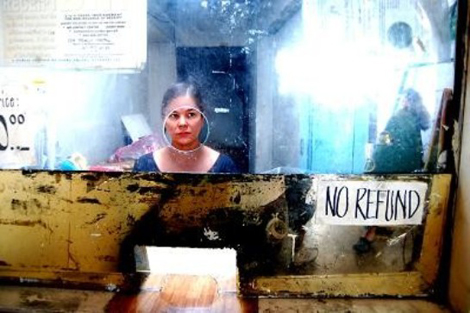
[This is the eighth part in an open series of reports from the New York Film Festival.]
(Our podcast interview with filmmaker Jerzy Skolimowski can be found here.)
Much like American filmmaker Terrence Malick, Polish auteur Jerzy Skolimowski spent a large chunk of time out of commission. But he now returns to cinema after a seventeen year absence with Four Nights with Anna (now making the film festival rounds and emerging next week in New York) and America, a film currently in production. That Skolimowski never quite received the laurels awarded to the likes of Roman Polanski and Andrzej Wajda is something of an unpardonable oversight. For Skolimowski demonstrated with 1982’s Moonlighting that he was an adept and muted iconoclast. In that film, he took aim at the Polish government’s assault on the Solidarity movement through a very straightforward premise: a group of Polish workers, recruited because they can work for cheap, remodels a London house for a diplomat. But the central Polish figure (played by Jeremy Irons) begins to steal food and desperately hits on women. And his behavior offers the audience a Rorschach test about the degree to which Irons’s personal plundering is politically motivated, also raising questions about the responsibility Westerners have to take care of immigrants.
A house likewise figures into Four Nights with Anna. It is a ramshackle and nearly uninhabitable domicile assembled together with stray bits of lumber, and it is occupied by a clumsy, middle-aged man named Leon (played by Artur Steranko). We learn early on that Leon has served some prison time. He wears an ill-fitting jacket that barely confines his chunky frame. He circles around other people, as if terrified of the possibilities of social interaction. He is clumsy, frequently slipping into the mud. He is also quite a creepy protagonist, reminiscent of the protagonist in Ross Raisin’s novel, Out Backward, and it’s not just because he works for a crematorium and keeps malodorous body parts in his shack just before disposing of them. For he also spends his spare time peeping at his neighbor — the titular (in more than one sense of the word) Anna, a nurse who we likewise obtain sparse details about and whose house Leon frequently wanders into through the window. Anna has plenty of friends who will come to her birthday party, but she spends much of her time alone. We see her purchasing bottles of wine and cigarettes with a friend. But she doesn’t notice Leon at the store. Indeed, she doesn’t seem to be aware of his presence next door. Or so we are led to believe.
It was something of a brave gesture on Skolimowski’s part to present Anna largely from Leon’s perspective. We know almost nothing about her, aside from her avocation and (in flashback; or is it flashforward?) the horrible fact that she was raped. This presents Kinga Preis, who plays Anna, with a scenario in which she is objectified by Leon and therefore the camera, which could not have been an easy thespic sell when Skolimowski was casting. Anna, however, was not necessarily raped by Leon. Leon stumbled upon the rape in progress and, if we are to believe him, did nothing and ran away. He then served a prison sentence because he was unable to recall quite what happened, although his account, if we are to rely on it, involves a dead cow floating down a river and a siren timed either before or after.
Skolimowski’s central question here involves what Polish society should do with a person like Leon. And he wisely avoids a full explanation about Leon’s backstory. We learn that Leon was raped while in prison, but I felt this, and a few other details, were needless efforts to capitulate to the audience’s empathy. After all, should we not accept Leon for who he is? The degree to which an audience member is likely to demonize Leon reflects the degree of empathy that an audience member is likely to feel for the less palatable members of society. To suggest this, Skolimowski’s camera frequently tracks along the windows of houses and down streets, and this visual decision affords us a sideways glance that doesn’t even begin to delve into his tortured psyche. Leon may be a creepy voyeur, but we are just as much voyeurs when it comes to people like Leon. For we have only superficial ideas about their lives to go by. And Skolimowski suggests that there’s something sadly contemporary about this moral hypocrisy by placing two specific items in Anna’s house: (1) an old clock that Leon tries to repair and (2) an artificial waterfall landscape confined within a box that lulls Anna to sleep. The wry imputation here is that Anna, much like many seemingly well-adjusted members of society, prefers to ignore the reality of passing time, itself a more quantifiable measure, for a false atmospheric screen that blocks out the more troubled members of society. As we learn later in the film, she is indeed very aware of Leon. Perhaps more aware than we ever anticipated.
The film, however, has grave problems. As I’ve suggested, Skolimowski tries to have it both ways. Leon is someone we should empathize with based on sketchy information. But Leon is also someone we should empathize with because he is ordered by a tough police officer who has asked Leon for a statement to pick up an ashtray that he has knocked to the floor. There is the suggestion of cyclical behavioral patterns with one deadpan joke involving Leon being accused of stealing a ring from a disembodied hand. Later, after this scenario has been resolved, we see Leon purchasing another ring, which he wishes to give to Anna. While this is an interesting semiotic, it doesn’t entirely submerge us into the ethical quandary of Skolimowski’s central question. Thus, the film doesn’t quite live up to the complexities presented in Skolimowski’s other films.
But it is good to have Skolimowski back in the saddle, even if this latest offering offers decidedly mixed results. Perhaps Skolimowski’s next film, which, like Moonlighting, deals with a Polish emigrants attempting to find an identity in another nation, might see Skolimowski achieve another masterpiece in his autumn years.




